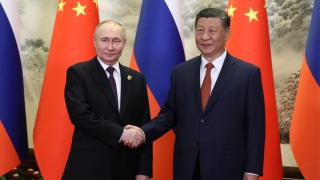May 21—The hypocrisy and cluelessness of the so-called West on the subject of “democracy” is so profound, that these self-proclaimed bastions of that virtue oppose, adamantly, the democratization of international relations occurring with accelerating speed across the world.
Any opposition to Israeli policy is reflexively branded as anti-Semitic. Nations investigating the foreign funding of color revolutions are threatened with sanctions. UN Security Council decisions and World Court orders are interpreted as “non-binding.” The U.S. Congress is considering sanctions against the International Criminal Court, on the basis that if Israelis can be charged, so could Americans. The Speaker of the House demanded that the White House “use every available tool to prevent such an abomination.”
Meanwhile, the “Global Majority” has a very different view of the world.
Russia and China signed a profound 8,000-word joint statement in Beijing on May 16, that assesses that “the status and strength of emerging powers in the ‘Global South’ countries and regions are constantly increasing” while “the trend of multipolarity is accelerating.”
But “countries that adhere to hegemonism and power politics are contrary to this trend.” Such countries are “attempting to replace and subvert the international order based on international law with a so-called ‘rules-based order.’”
They call for an international order free of “neo-colonialism and hegemonism,” based instead on international law, with the UN Charter at the center. Both sides “oppose the hegemonic actions of the United States to change the balance of power in the Northeast Asia region by expanding its military presence and forming military blocs.”
“The U.S., with its Cold War mentality and bloc confrontation model,” the statement reads, “puts ‘small group’ security above regional security … endangering the security of all countries in the region.”
“The United States should stop such behavior,” the statement bluntly says, and encourages the U.S. to make good on its errors: “the United States and NATO, as the parties responsible for the 20-year invasion and occupation of Afghanistan, should not again attempt to deploy military facilities to Afghanistan and its surrounding areas. Instead, they should bear the main responsibility for Afghanistan’s current economic and people’s livelihood difficulties and bear the main expenditures for Afghanistan’s reconstruction, and take all necessary measures to lift the freeze on Afghanistan’s national assets.”
Good advice!
American statesman and economist Lyndon LaRouche gave his own advice for what may today be the most fraught area of the world—Southwest Asia. In a 2002 speech made in the United Arab Emirates, LaRouche identified the importance of the region to the world:
The world has come to a crossroads in modern history. If the world were to continue along the pathway currently chosen by my government and some others, civilization will be plunged, for as long as a generation or more, into a global dark age comparable to that which struck Europe about seven-hundred-fifty years ago. We must not pretend that danger does not exist; but, also, we must commit ourselves to the hopeful alternative which wise governments will prefer. Therefore, I shall speak frankly, but also optimistically, of a second crossroads, the Middle East.
The history of oil in this region, began with the British Navy’s plans for what became known as the Great War of 1914-1918. That Empire intended to use petroleum extracted from this region, to provide its navy the crucial strategic advantage, of a change to oil-burning, from coal-burning warships. Since that time, as all nations represented here know, this region has been dominated by the great powers’ struggles over control of the special, strategically significant economic advantages of oil extracted from this region. But, it was never oil alone which shaped the fate of the Middle East; for as far back as known history of civilization reaches, long, long before the discovery of oil, the Middle East has been the strategic crossroads of Eurasia and Africa combined, as it is today. With or without petroleum, the historic strategic significance of the Middle East would remain.
“[T]he most critical of the strategic economic factors inside the Middle East region as a whole today, is not petroleum, but fresh water,” LaRouche said. Through the use of our greatest resource, the individual human mind, man creates resources, and should create vast new flows of freshwater in this great world crossroads, this natural hub for connectivity and interaction.
The world cannot forever remain in limbo, balanced between the potential futures of global warfare and a new paradigm of growth.
Implementing the LaRouche Oasis Plan and developing a new system of international relations through a discussion among such concepts as those laid out by Russia and China, and Helga Zepp-LaRouche’s proposed Ten Principles of a New International Security and Development Architecture.






